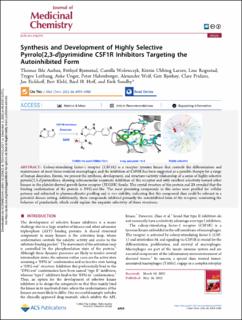Synthesis and Development of Highly Selective Pyrrolo[2,3-d]pyrimidine CSF1R Inhibitors Targeting the Autoinhibited Form
Aarhus, Thomas Ihle; Bjørnstad, Frithjof Andreas; Wolowczyk, Camilla Izabel; Larsen, Kristin Uhlving; Rognstad, Line; Leithaug, Trygve; Unger, Anke; Habenberger, Peter; Wolf, Alexander; Bjørkøy, Geir; Pridans, Clare; Eickhoff, Jan; Klebl, Bert; Hoff, Bård Helge; Sundby, Eirik
Peer reviewed, Journal article
Published version
Permanent lenke
https://hdl.handle.net/11250/3107494Utgivelsesdato
2023Metadata
Vis full innførselSamlinger
- Institutt for bioingeniørfag [184]
- Institutt for kjemi [1353]
- Institutt for materialteknologi [2497]
- Publikasjoner fra CRIStin - NTNU [37221]
Originalversjon
Journal of Medicinal Chemistry. 2023, 66 (10), 6959-6980. 10.1021/acs.jmedchem.3c00428Sammendrag
Colony-stimulating factor-1 receptor (CSF1R) is a receptor tyrosine kinase that controls the differentiation and maintenance of most tissue-resident macrophages, and the inhibition of CSF1R has been suggested as a possible therapy for a range of human disorders. Herein, we present the synthesis, development, and structure–activity relationship of a series of highly selective pyrrolo[2,3-d]pyrimidines, showing subnanomolar enzymatic inhibition of this receptor and with excellent selectivity toward other kinases in the platelet-derived growth factor receptor (PDGFR) family. The crystal structure of the protein and 23 revealed that the binding conformation of the protein is DFG-out-like. The most promising compounds in this series were profiled for cellular potency and subjected to pharmacokinetic profiling and in vivo stability, indicating that this compound class could be relevant in a potential disease setting. Additionally, these compounds inhibited primarily the autoinhibited form of the receptor, contrasting the behavior of pexidartinib, which could explain the exquisite selectivity of these structures.

